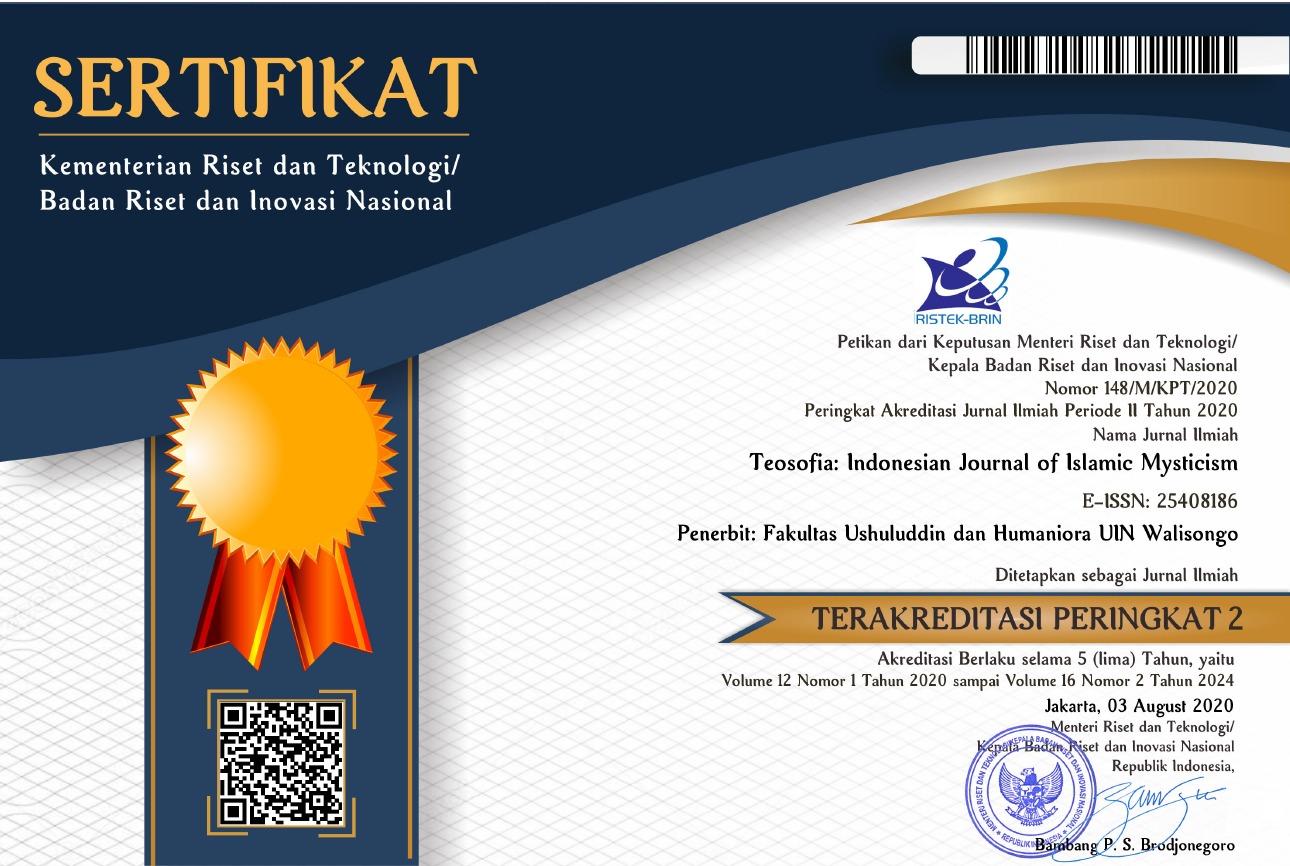Weberian Sociology and Portrait of Contemporary Sufism Studies
DOI:
https://doi.org/10.21580/tos.v9i2.7864Keywords:
Weberian Sociology, Sufism, Euro-centrism, Counter-sociologyAbstract
Applying Weberian sociology to the study of Islam is a problematic undertaking. This paper highlights the difficulties in reconciling the Western approach to the study of religion and Islam with the principles of objective and unbiased scholarship. Max Weber is considered one of the fathers of modern sociology, yet his major works largely ignore Islam and Muslim society. If he mentions Islam, then only briefly and with a lot of misgivings. Weber’s persistent bias towards Islam has generated a lot of consternation in Muslim circles and has given rise to much speculation and debate. Some of Weber’s intellectual heirs have tried to fill this gap and included Islam in their research. Although the result is often unbalanced and unsympathetic, his successors have enriched the sociological study of Islam and Sufism. Weber’s modern critics have refuted his major hypotheses and introduced a more objective approach to the study of Islam and Sufism. The ongoing dispute between the Weberians and their opponents on the nature of Sufism invites further discussion. This paper is aimed at examining this debate exploring the richness of spiritual Islam as studied by Weberian sociologists and their critics.Downloads
References
Alatas, Syed Farid. “The Weber Thesis and South East Asia.” Archives de Sciences Sociales Des Religions 15, no. 1 (1963): 21–34. https://doi.org/10.3406/assr.1963.1719.
Anjum, Ovamir. “Putting Islam Back into Equation: Islam as a Discursive World-System.” In Islam and the Orientalist World-System, edited by Khaldoun Samman and Mazhar Al-Zo’by. USA: Routledge, 2008.
Arslan, M. “The Work Ethic Values of Protestant British, Catholic Irish and Muslim Turkish Managers.” Journal of Business Ethics 31 (2001): 321–339. https://doi.org/https://doi.org/10.1023/A:1010787528465.
Bennett, Clinton, and Sarwar Alam. Sufism, Pluralism, and Democracy. England: Equinox, 2017.
Berger, Peter L. “Charisma and Religious Innovation: The Social Location of Israelite Prophecy.” American Sociological Review 28, no. 6 (December 1963): 940. https://doi.org/10.2307/2090313.
Bilqies, Shahida. “Understanding the Concept of Islamic Sufism.” Journal of Education & Social Policy 1, no. 1 (2014): 55–72. http://jespnet.com/journal/index/2130.
Bruinessen, Martin van. “Sufism, Popular Islam and the Encounter with Modernity.” In Islam and Modernity: Key Issues and Debates, edited by Muhammad Khalid Mas’ud, Armando Salvatore, and Martin van Bruinessen. Edinburgh: Edinburgh University Press, 2009.
Cornell, Vincent J. Realm of the Saint: Power and Authority in Moroccan Sufism. Texas: University of Texas Press, 1998.
Demir, Ömer, Mustafa Acar, and Metin Toprak. “Anatolian Tigers or Islamic Capital: Prospects and Challenges.” Middle Eastern Studies 40, no. 6 (November 8, 2004): 166–88. https://doi.org/10.1080/0026320042000282937.
Dressler, Markus, Ron Geaves, and Gritt Klinkhammer. “Introduction.” In Sufis in Western Society: Global Networking and Locality. USA: Routledge, 2009.
Eickelman, Dale F. “Muslim Publics.” In Public Islam and the Common Good, edited by Armando Salvatore and Dale F. Eickelman. Leiden: Brill, 2006.
Encyclopedia.com. “‘Functionalism and Structuralism’ Encyclopedia of Sociology,” February 7, 2021. https://www.encyclopedia.com/social-sciences/encyclopedias-almanacs-transcripts-and-maps/functionalism-and-structuralism.
Evans-Pritchard & Edward Evan. The Sanusi of Cyrenaica. At the Clarendon Press, 1949, https://ehrafworldcultures.yale.edu/document?id=mt09-003.
Geaves, Ron, and Theodore Gabriel. Sufism in Britain. London: Bloomsbury, 2014.
Green, Nile. Sufism: A Global History. UK: Wiley-Blackwell, 2012.
Hernandez, Rebecca Skreslet. The Legal Thought of Jalāl Al-Dīn Al-Suyūṭī: Authority and Legacy. Oxford: Oxford University Press, 2017.
Knysh, Alexander. Sufism: A New History of Islamic Mysticism. New Jersey: Princeton University Press, 2017.
Malik, Jamal, and Saeed Zarrabi-Zadeh. “Introduction.” In Sufism East and West. Leiden: BRILL, 2019. https://doi.org/10.1163/9789004393929_002.
Milani, Milad, Adam Possamai, and Firdaus Wajdi. “Branding of Spiritual Authenticity and Nationalism in Transnational Sufism.” In Religions, Nations, and Transnationalism in Multiple Modernities, edited by Patrick Michel, Adam Possamai, and Bryan S. Turner. New York: Palgrave Macmillan, 2017.
Moore, K. “Paradoxes of Modernity: Culture and Conduct in the Theory of Max Weber. By Wolfgang Schluchter. Stanford University Press, 1996. 389 Pp. $45.00.” Social Forces 75, no. 4 (June 1, 1997): 1495–96. https://doi.org/10.1093/sf/75.4.1495.
al-Qurtuby, Sumanto. “Islam, Muslim, and Anthropology,” International Journal of Islamic Thought 20, (2021): 138-155. https://doi.org/10.24035/ijit.20.2021.218 138
Raudvere, Catharina, and Leif Stenberg. Sufism Today: Heritage and Tradition in the Global Community. London: IB Tauris, 2009.
Reynolds, Michael. “Myths and Mysticism: A Longitudinal Perspective on Islam and Conflict in the North Caucasus.” Middle Eastern Studies 41, no. 1 (2005): 31–54. http://www.jstor.org/stable/4284344.
Runciman, W. G. “The Sociological Explanation of ‘Religious’ Beliefs.” European Journal of Sociology 10, no. 2 (November 28, 1969): 149–91. https://doi.org/10.1017/S0003975600001806.
Salvatore, Armando. The Sociology of Islam: Knowledge, Power, and Civility. USA: Wiley-Blackwell, 2016.
Schluchter, Wolfgang, and Toby E. Huff. Max Weber and Islam. London and New York: Routledge, 1999.
Sedgwick, Mark. “Sufi Religious Leaders and Sufi Orders in the Contemporary Middle East.” Sociology of Islam 6, no. 2 (June 6, 2018): 212–32. https://doi.org/10.1163/22131418-00602007.
———. Western Sufism: From the Abbasids to the New Age. Oxford: Oxford University Press, 2017.
Seesemann, Rudiger. The Divine Flood: Ibrahim Niasse and the Roots of a Twentieth-Century Sufi Revival. Oxford: Oxford University Press, 2011.
Sharot, Stephen. A Comparative Sociology of World Religions: Virtuosos, Priests, and Popular Religion. New York: New York University Press, 2001.
Soyer, Mehmet. “Examining the Origins of Sociology: Continuities and Divergences Between Ibn Khaldun, Giambattista Vico, August Comte, Ludwig Gumplowicz, and Emile Durkheim.” University of North Texas, 2010.
Turner, Bryan S. For Weber: Essays on the Sociology of Fate. Boston: Routledge and Kegan Paul, 1981.
———. Max Weber: From History to Modernity. London: Routledge, 1992.
———. “Revisiting Weber and Islam.” The British Journal of Sociology 61, no. 1 (January 14, 2010): 161–66. https://doi.org/10.1111/j.1468-4446.2009.01285.x.
Weber, Max. From Max Weber: Essays in Sociology. Edited by Hans Heinrich Gerth and Charles Wright Mills. United Kingdom: Routledge, 1991.
_______. Wirtschaft und Gesellschaft – Grundriß der verstehenden Soziologie. Tübingen: Mohr, 1980.
Werbner, Pnina. Pilgrims of Love: The Anthropology of a Global Sufi Cult. London: Hurst and Company, 2003.
Downloads
Published
How to Cite
Issue
Section
License
Copyright
The copyright of the received article shall be assigned to the journal as the publisher of the journal. The intended copyright includes the right to publish the article in various forms (including reprints). The journal maintains the publishing rights to the published articles. Therefore, the author must submit a statement of the Copyright Transfer Agreement.*)
Licensing

This work is licensed under a Creative Commons Attribution-ShareAlike 4.0 International License.
In line with the license, authors are allowed to share and adapt the material. In addition, the material must be given appropriate credit, provided with a link to the license, and indicated if changes were made. If authors remix, transform or build upon the material, authors must distribute their contributions under the same license as the original.
_______
*) Authors whose articles are accepted for publication will receive confirmation via email and send a Copyright Transfer Agreement.








